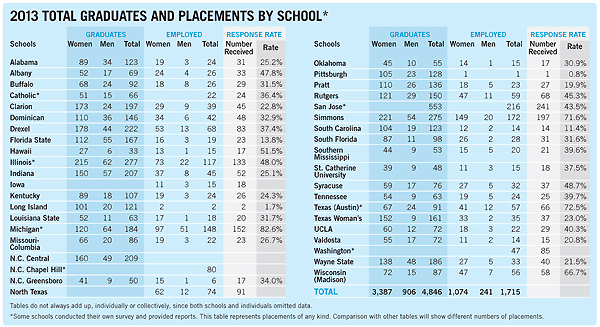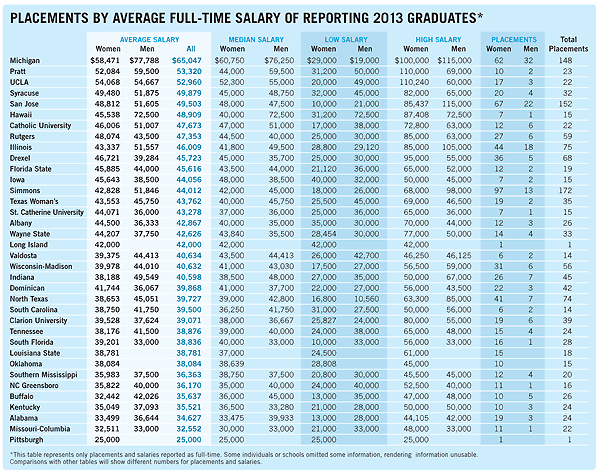Placements & Salaries 2014: More to the Story
Also in this article:
More to the story
Salary gains and losses only tell a portion of the placement story for the graduating class. Of the 2,023 graduates responding to this year’s survey, approximately 81.4% said they were employed. This was down slightly from the 2012 class when 85.6% reported employment of any sort. However, 66.9% of those employed were in a permanent, professional position, up from the previous year’s report of 61.2%. Southeast grads enjoyed the best rate of permanence, reporting 83.2% of the jobs as permanent professional placement, also a significant improvement over 2012 when 66.7% reported permanent status.
Reports of jobs defined as temporary or contract positions, which often do not include the same benefits as permanent full-time employment (health care, paid days off, etc.) declined from 10.5% in 2012 to 6.6% among the 2013 grads. This may be a signal of economic improvements with employers regaining the ability to hire permanent staff. Several of temporary positions fell outside of LIS and into private industry where grads described themselves as consultants and analysts, suggesting job functions may change as organizations’ needs do.
Graduates accepting positions outside of LIS increased from 9.5% of 2012 placements to 12.1% in 2013. As in previous years there was a wide range of employers outside of the LIS profession, including government agencies, private industry, and nonprofit organizations. One recent grad suggested, “Employers are beginning to recognize the importance of library science degrees.” Jobs requiring research skills, such as those in legal and government research, grant writing expertise, and fundraising and donor development were options exploited by members of the 2013 graduating class. They also used skills in project management and social media to find positions in leading teams and developing the online presence of start-up companies and charitable organizations.
Approximately 32% of individuals who reported employment remained with an employer throughout their studies and after graduation. This continues the downward trend set in previous years, dropping from a high of 47% in 2010 to 35% in 2012. As some grads were quick to point out, they already had a professional position within the organization but needed degree credentials to be eligible for further promotion or endorsement. Public librarians (31.1%) were more likely to remain with a current employer, and approximately half of this group also reaped the benefits of earning an advanced degree. For some this meant a promotion and/or a raise; for others, it offered greater mobility within the library system.
Academic librarians finally saw the fruits of their efforts with 28.2% of those who held a position throughout their graduate studies achieving a raise, tenure status, or a promotion with the granting of the degree (up from the previous year when 17% received raises or promotions). For some academic librarians, however, earning the LIS degree was bittersweet. Several individuals shared disappointment in not finding an academic library position quickly owing to the necessity of completing a second graduate degree before applying for professional positions.
While only 12.5% of school librarians reported remaining with the same school district before and after the completion of the degree, approximately 42% were able to take advantage of increased salaries and promotions. Some teachers remained in the classroom upon earning the LIS degree but also took on the role of technologist or media supervisor. Others made the shift from the classroom to the school media center, but in some cases this meant they were assigned to multiple schools.
Advising future colleagues
Once again members of the graduating class shared their experiences and advice in their own words. As in previous years, a sense of real accomplishment was balanced by disappointment and frustration.
Among grads who spoke about finding employment prior to graduation, approximately 37% had a job waiting for them upon the granting of the degree. Some began their search well in advance of completing their studies, anticipating a competitive job market. Others waited until the semester before graduating because the positions they sought required the degree in hand. In a few cases, they experienced a delay from the time of offer prior to graduation to the start date after graduation, indicating the importance of the completed degree.
The résumé and CV were all important for the 2013 graduating class. They recommended attending résumé-building workshops, having others proofread everything, and tailoring one’s résumé and cover letter for each application submitted—in some cases hundreds.
As in previous years, networking held high priority. Several grads indicated, “You have to know someone.” Internships, paraprofessional jobs, and practicums were cited again as necessities to develop not only the skills needed but the contacts and relationships to land jobs. Among the 2013 graduates, social networking became increasingly important. They engaged in social media to interact with potential employers and were recruited through these sources. Others maintained blogs and websites, which were read by recruiters.
The search for many LIS grads was a full-time job in itself. Besides polishing résumés and portfolios, this meant practicing interviewing skills and using informational interviews to learn about the current professional environment. The best suggestion shared by the graduating class of 2013 was, “You are on the job hunt from the moment you enter into your MLIS program. Use your time wisely, make contacts, follow up, look for ways to differentiate yourself, and always be your best advocate—don’t sell yourself short.” They also said to “think more about the service you want to provide, and less about the place you will work.”
The graduating class of 2013 offered similar reactions to the job search as their colleagues from previous classes. Those who landed a job just prior to or shortly after graduation felt “fortunate”; others found it necessary to compromise in the type of job they sought. Graduates cited another year of “not enough experience for an entry-level position” and “a competitive pool of applicants.” Some advised those following in their footsteps to consider “second choice” options and “to be flexible” in approaching the range of jobs. One graduate suggested the second choice option might turn out to be the most fun.
RELATED
ALREADY A SUBSCRIBER? LOG IN
We are currently offering this content for free. Sign up now to activate your personal profile, where you can save articles for future viewing












Add Comment :-
Comment Policy:
Comment should not be empty !!!